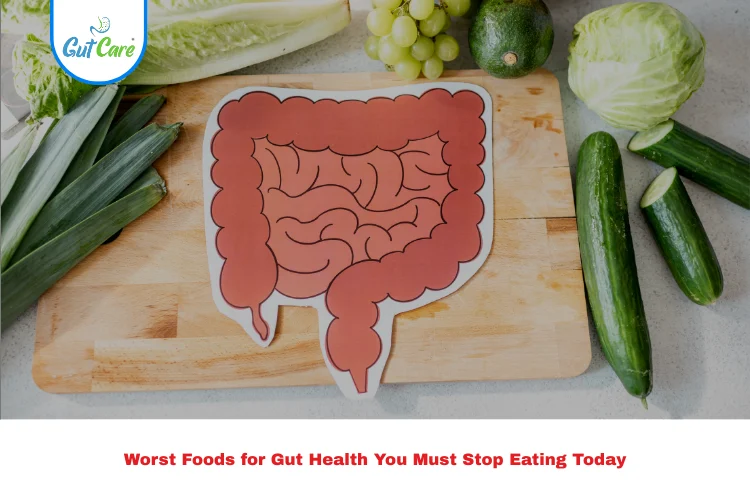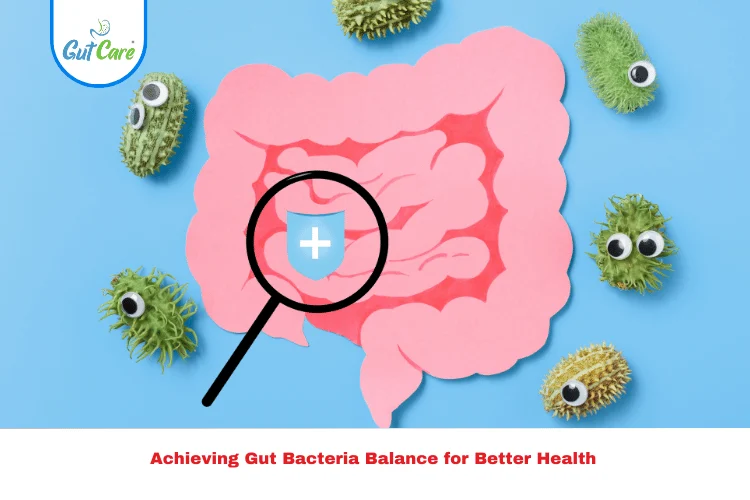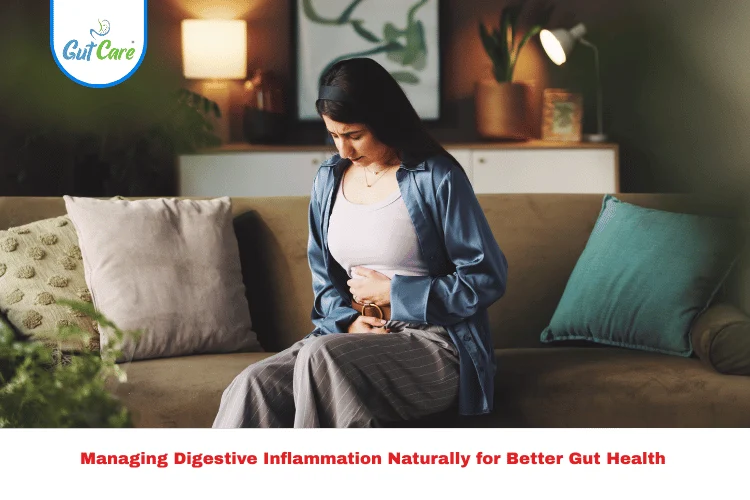If you’ve ever experienced bloating, indigestion, or constant stomach discomfort and wondered why—it could be your diet. What you eat directly shapes your gut microbiome, which in turn affects digestion, immunity, and even mood. Unfortunately, many of the foods we reach for daily are silently damaging our gut. In this article, we’ll break down the 10 worst foods for gut health, why they’re harmful, and what to choose instead.
With insights from Dr. Yuvrajsingh Gehlot, a leading gut health specialist at Gutcare Clinics in Bangalore, this guide will help you understand how to protect your gut and when to seek medical help if symptoms persist.
Why Gut Health Should Be Your Priority
Your gut is home to trillions of bacteria—some good, some bad. When there’s balance, digestion runs smoothly, nutrients are absorbed, and immunity stays strong. But when harmful bacteria outnumber the good, problems like gas, constipation, diarrhea, acid reflux, or even chronic conditions such as IBS (Irritable Bowel Syndrome) can develop.
One of the biggest culprits for this imbalance? The food on your plate.
1. Processed Meats
Think bacon at breakfast, sausages at dinner, or that hot dog at a weekend party. These meats are loaded with preservatives, nitrates, and saturated fats that wreak havoc on your gut. They create an acidic environment that encourages harmful bacteria to grow. Over time, they’re linked not only with digestive issues but also with colon cancer risk.
Better option: Choose fresh lean meats like chicken, fish, or plant-based proteins such as lentils and chickpeas.
2. Fried Foods
Who doesn’t love crispy French fries or a crunchy samosa? The problem is that fried foods are heavy in unhealthy oils and take much longer for your stomach to process. This leads to sluggish digestion, bloating, and acid reflux. Regular intake can even weaken your gut lining.
Better option: Opt for baked or air-fried alternatives that give you the same crunch with less harm.
3. Artificial Sweeteners
“Sugar-free” isn’t always gut-friendly. Artificial sweeteners like aspartame, sucralose, and saccharin are commonly found in diet sodas, chewing gum, and sugar-free desserts. Studies show they alter the gut microbiome by reducing healthy bacteria and increasing bloating or diarrhea in some people.
Better option: Use natural sweeteners like honey or jaggery in moderation.
4. Refined Sugars
Cakes, candies, cookies, and sodas might satisfy your cravings, but refined sugar feeds yeast and harmful bacteria in your gut. This creates an imbalance that contributes to inflammation, poor digestion, and low immunity.
Better option: Replace with fruits, dates, or naturally sweet snacks that also provide fiber.
5. Processed Carbohydrates
White bread, white pasta, and pastries are stripped of fiber during processing. Without fiber, your healthy gut bacteria starve. Over time, this weakens your microbiome and makes digestion sluggish.
Better option: Whole grains like brown rice, oats, and multigrain bread feed the good bacteria and improve bowel movements.
6. Alcohol
A casual drink may not do much harm, but regular or heavy drinking is a different story. Alcohol irritates the stomach lining, causes inflammation, and alters gut bacteria. It’s also a common trigger for acid reflux and gastritis.
Better option: If you drink, keep it moderate and hydrate well. Herbal teas or fruit-infused water are healthier alternatives.
7. Dairy Products (for lactose intolerance)
For people with lactose intolerance, milk, cheese, and ice cream can be gut nightmares. Since their bodies can’t digest lactose properly, symptoms like bloating, diarrhea, and abdominal pain are common. For such individuals, dairy is among the worst foods for gut health.
Better option: Lactose-free dairy, almond milk, or coconut yogurt.
8. Caffeinated Drinks
That morning coffee might give you energy, but too much caffeine can trigger acid reflux, dehydration, and disturbed sleep—all of which harm your gut health. Energy drinks and sodas are even worse, combining caffeine with sugar or artificial sweeteners.
Better option: Limit coffee to one cup a day, or switch to herbal teas for gut-friendly energy.
9. Highly Spicy Foods
Spices are part of our culture and cuisine, but very spicy foods can irritate the gut lining. For those with gastritis, ulcers, or acid reflux, too much chili and hot sauce can worsen symptoms.
Better option: Use spices like turmeric and ginger, which actually support gut health.
10. Packaged Snacks
Instant noodles, chips, and ready-to-eat snacks are convenient, but they’re filled with trans fats, preservatives, and additives. These chemicals disrupt your gut bacteria and slow digestion. Eating them regularly puts your digestive health at risk.
Better option: Choose homemade snacks like roasted nuts, fresh fruit, or sprouts.
When Should You See a Doctor?
If your digestive issues are occasional, dietary changes often help. But if you experience persistent bloating, chronic constipation, diarrhea, or unexplained abdominal pain, it’s important to seek professional advice.
At Gutcare Clinics in Bangalore, Dr. Yuvrajsingh Gehlot specializes in diagnosing and treating complex digestive disorders. He emphasizes that while avoiding the worst foods for gut health is essential, medical care is necessary for long-term relief and accurate diagnosis.
Remedies and Healthier Alternatives
Here are some simple, gut-friendly swaps:
- Replace white bread with whole wheat or multigrain bread.
- Swap fried snacks for roasted or baked options.
- Add probiotics like yogurt, kefir, or fermented foods to your diet.
- Drink plenty of water to aid digestion.
- Eat slowly and chew well to give your gut less strain.
By consciously avoiding harmful foods and adding nourishing ones, you can restore balance to your gut microbiome.
Conclusion
The foods you eat daily can either heal or harm your digestive system. From processed meats and fried foods to sugary drinks and packaged snacks, the worst foods for gut health damage your microbiome and trigger long-term problems.
If you notice ongoing symptoms, don’t ignore them. A consultation with an expert like Dr. Yuvrajsingh Gehlot at Gutcare Clinics, Bangalore, can help you find the root cause and create a tailored treatment plan.
Remember: a healthy gut means better digestion, stronger immunity, and even improved mental well-being. Your journey to good health begins with your next meal.
FAQs
1. What are the 10 worst foods for gut health?
The worst foods for gut health include processed meats, fried foods, refined sugars, artificial sweeteners, alcohol, dairy (if lactose intolerant), packaged snacks, processed carbs, excessive caffeine, and overly spicy foods.
2. How do artificial sweeteners affect gut health?
Artificial sweeteners disrupt the balance of gut bacteria, often leading to bloating, gas, or diarrhea, making them one of the worst foods for gut health.
3. Can alcohol damage gut health permanently?
Long-term heavy drinking can damage the gut lining and alter the microbiome permanently, leading to chronic digestive problems.
4. When should I see a doctor for digestive issues?
If symptoms like bloating, diarrhea, or abdominal pain are frequent or severe, consult a gut health specialist such as Dr. Yuvrajsingh Gehlot.
5. Where can I find expert gut health treatment in Bangalore?
At Gutcare Clinics in Bangalore, patients receive specialized care for digestive problems, including guidance on avoiding the worst foods for gut health.




